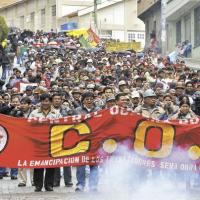
Indigenous movement and general strike force five ministers resignations
The political situation in Bolivia has reached a turning point. The government is facing a major crisis after a massive movement of indigenous people, followed by a solid general strike, forced five ministers to resign.
Last Sunday, a major national march of indigenous people arrived in the capital, La Paz. This was the culmination of a months long protest march against the building of a highway through an Indian reserve in the Amazon. The highway is being built in order to facilitate big Brazilian capital exporting its products via the Pacific Ocean.
The marchers were met in La Paz by severe repression, as the police used battons and tear gas to break up their demonstrations. The leaders of the movement were also arrested.
In response to the brutal treatment of the movement there was an explosion of anger on Wednesday. The Bolivian Workers Centre (Central Obrera Boliviana – COB), which is the main trade union federation in Bolivia, declared a national general strike. The strike was solid and caused paralysis in the capital. Three government ministers resigned in protest at the policies of the government and two were forced to resign as a result of the demands of the movement.
There is broadening disillusionment with the self-proclaimed "socialist" government of Evo Morales. Morales is the first indigenous president of Bolivia and first gained his support by basing himself on this section of population. However Morales failed to implement the changes to the constitution that he agreed with the indigenous and the unions. It is highly significant that he is losing his main bases of support.
Many activists are saying that the government is at a dead end. Some of the most politically conscious layers of workers, such as the miners, are swinging sharply to the left.
Last week the miners union made a statement which said that, although they supported the government and its reforms in the past, they no longer support it. They demand the taking into public ownership of the multinational companies, an end to neo-liberalism and capitalism and the introduction of a socialist economy. They also referenced the deep and fundamental crisis of international capitalism. This powerful union represents about 10,000 workers.

Miners on the general strike
Despite these very positive developments, the situation remains complicated. Morales has now apologised for the attack saying "We ask forgiveness – forgive me" and that "It was not an instruction by the president. No one in the government would have thought such an attack could happen to our indigenous brothers." But there is tremendous bitterness and an increasing questioning of Morales. At the same time the right wing is also involved in trying to exploit the indigenous movement, which is based in the east of the country. They see this as a way of undermining Morales’s wavering government. The eastern indigenous movement has received funding from US imperialism.
Nonetheless, the situation is currently very dynamic. The government is in crisis and could collapse. The question of a working class led political alternative to imperialism and capitalism is posed as the hopes in Morales are seriously undermined.
More reports, commentary and analysis will follow from Revolutionary Socialist Alternative (CWI Bolivia).

Be the first to comment